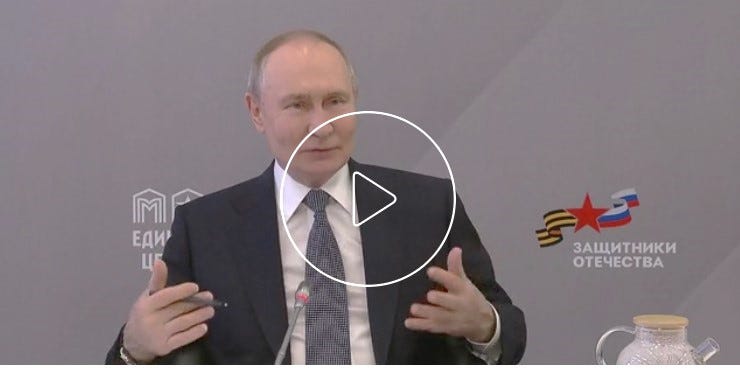Putin Unfiltered (2)
A meeting with representatives of the Defenders of the Fatherland Fund
This is a text from my informal series trying to convey better information about Russian politics than can be found in Western mainstream media. I pay particular attention to statements, policies, or events that the latter either distort, neglect, or entirely ignore – that is, a lot. While I cannot possibly fill that gap, I hope my efforts help Western readers in search of better and more serious coverage.
Here, I address a recent meeting (on 6 March) between the president of Russia Vladimir Putin and about twenty representatives of the Defenders of the Fatherland Fund, all of them women. The Russian presidency’s website has posted a long (over two hours) recording and a full transcript of the meeting, which are the basis for this text.
The fund is an important institution that emerged from the war between Russia, on one side, and Ukraine and the West, on the other. It was founded by presidential degree in 2023 and has branches in all of Russia’s 89 regions. Its “principle task,” to quote the website of the Russian government, “is individual social assistance and support [сопровождение] of veterans of the Special Military Operation [that is, the war in Ukraine] and of the families of fallen soldiers.”
I had to select aspects that appeared most interesting to me. But those who know Russian will see that it is very well worth listening to the whole meeting.
Some of the meeting consisted of questions, requests, and answers that concerned the details of the assistance and services offered by the fund and Russian public authorities, at the general, that is, federal as well as the regional level, to veterans of the war in Ukraine – or, in the official parlance that was used here, the “special military operation” – and their families. Such issues included, for instance, the standardization of these measures, requests to routinely extend them to further categories of family members, and the status of former prisoners who have volunteered for military service.
Here, incidentally, Putin made clear that this policy – often distorted in the West – makes distinctions: Certain categories of crime, such as treason and terrorism, disqualify prisoners. In essence, only those who have committed more or less ordinary crimes can volunteer.
Another thread running through the meeting may surprise those in the West who rely on Western mainstream media for their (dis)information about Russia: With many of the women present either the widows or mothers of fallen soldiers, the losses and sacrifices of war were by no means avoided in this recorded discussion with the president that is now posted on the presidency’s website. That is a notable fact worth paying attention to.




